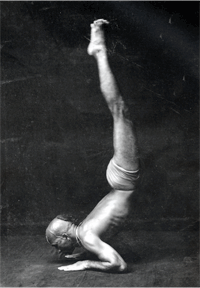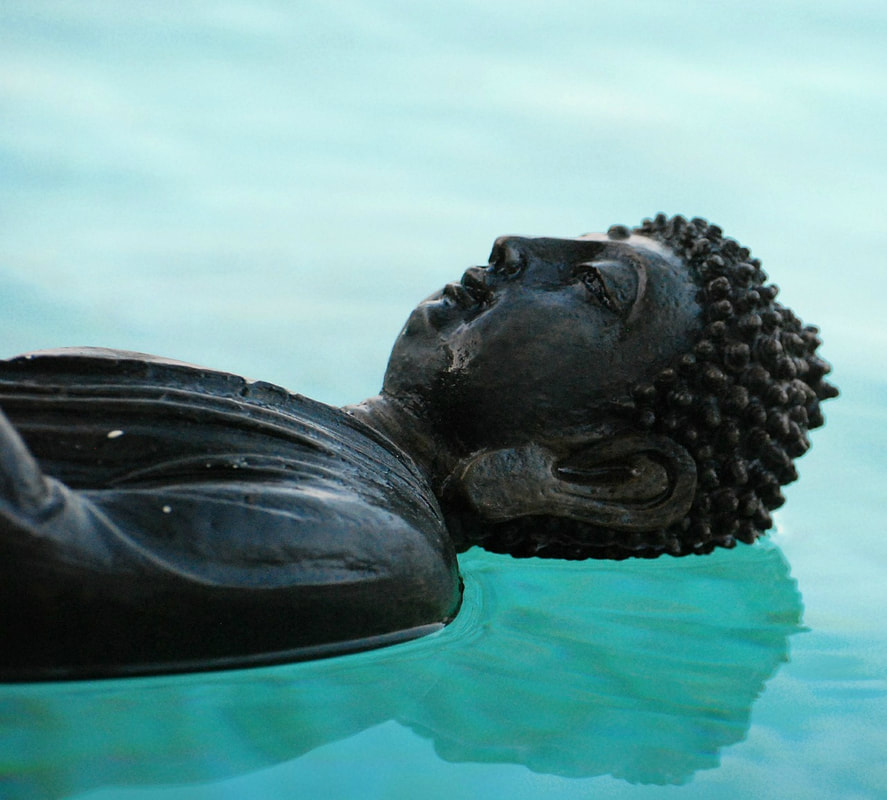 Tirumalai Krishnamacharya (1888-1989) is known as the modern father of yoga, touted with bringing hatha yoga to western culture. He began studying yoga at the age of five from his father and eventually became a yoga master, Ayurvedic physician, guru, linguist and Vedic scholar. He taught yoga for 70 some years. While teaching for the Maharaja of Mysore in the 30's, he became teacher to what became some of the most well-known names in yoga; his son, Desikachar, his brother-in-law Iyengar, his first western woman student Indra Devi and Patthabi Jois, who later developed Astanga yoga. The yoga that Krishnamacharya taught was not new yoga; it was all based on intense studies of Patangali's Yoga Sutras and other ancient texts. He felt there was only one type of yoga and that came from the Yoga Sutras. He taught that yoga was instrumental in achieving health. One misconception is that his teachings seemed to change. They did not change; they were thoughtfully altered to meet each student where their body was at that moment. He believed in teaching "what is appropriate for each individual” so taught differently to everyone. Desikachar writes he never saw his father teach the asanas to his mother but she knew them all perfectly. But Krishnamacharya restricted her practice from doing backbends, which he readily would teach to men her age. "What makes my father's yoga teachings unique is his insistence on attending to each individual and to his or her uniqueness. If we respect each person individually, it naturally means we will always start from where each person currently is. The starting point is never the teacher's needs but those of the student." Desikachar Krishnamacharya stated, "Yoga is an awareness, a type of knowing. Yoga will end in awareness. Yoga is arresting the fluctuations of the mind as said in the Yoga Sutras (of Patanjali): citta vritti nirodha. When the mind is without any movement, maybe for a quarter of an hour, or even quarter of a minute, you will realize that yoga is of the nature of infinite awareness, infinite knowing. There is no other object there.” It was very important to Krishnamacharya that the asanas be done slowly, with knowledge and with focus on the breath (pranayama). Acording to Krishnamacharya.net, he felt "that fast movements, and in turn, fast breathing will disturb the flow of prana and will result in imbalances. Slow movements with long inhale and exhale will help with proper prana flow and mental focus. " He said, "Practice without knowledge is blind. Knowledge without practice is futile." Krishnamacharya had such control over his breath and his body that one of the things he is most known for is being able to slow his breath so much that he could voluntarily stop his heartbeat for several minutes. Doctors present said they would have declared him dead. Then he would gradually bring back his breath, his pulse, his heartbeat. From Desikachar 's book Health Healing and Beyond, he writes, " "Father" , I said, " I want to learn this". "I will never teach it to you", he said. "Father," I argued, " I need to show others." "No!" he said, very forcefully. "This is not useful to society. This is only an achievement....," and here he used a term that might be translated from sanskrit as " ego trip". "I had to do this to convince the public about the power of Yoga. Now it is done. You don't have to learn this. you must only learn what is useful to the public, to society." Other quotes by Krishnamacharya and/or his students: "The rhythm of the body, the melody of the mind and the harmony of the soul create the symphony of life." Ivengar "Anybody can breathe. Therefore anyone can practice yoga." Desikachar "Because yoga is not fixed. Yoga is creation." Desikachar “Inhale, and God approaches you. Hold the inhalation, and God remains with you. Exhale, and you approach God. Hold the exhalation, and surrender to God.” Krishnamacharya "Where is the delusion when the Truth is known? Where is the disease when the Mind is clear? Where is death when the Breath is controlled? Therefore, surrender to YOGA." Krishnamacharya
0 Comments
Leave a Reply. |
Archives
March 2024
|

 RSS Feed
RSS Feed